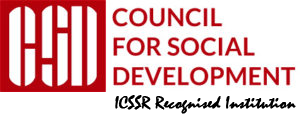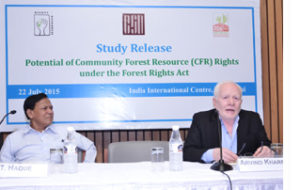Concept Note
The Workshop on National Education Policy and Higher Education in India” has been postponed; new dates will be announced later.
Growth in education in India has been very impressive. With 41 million students, 1.5 million teachers, more than 1,000 universities, and about 40,000 colleges, the Indian system of higher education is the second largest system in the world, after China. However, it is plagued by a variety of problems, the most important of them being a very high degree of inequality, poor quality, and an overall low enrolment ratio, though in the case of all these fronts there has been an improvement over the years.
Inequality in higher education spans gender inequalities, inequality caste and religion, regional inequalities, and inequalities by economic status. Though significant improvement in overall gender inequality, and impressive improvements in caste inequality by caste are made, regional inequality and inequalities by the economic status of households are still very serious. Further, higher education is also characterized by a few grave problems, such as underfunding, teacher shortages, fewer enrolments in post-graduate and research programmes, scanty research, a predominance of the private sector, and governance. Curricular reforms and reforms in regulation are also long overdue. The second largest system in the world has no world-class universities, and has only a very few institutions that figure in global rankings; the system is also not able to attract international students in good numbers.
This is in this overall background, the National Education Policy 2020 which fills the long-felt policy vacuum in education, has been announced by the Government of India. Considering the rapidly changing socioeconomic and political conditions in the country and global developments, including globalisation, the heralding of demographic dividends, revolution in information and communications technology, widely shared national development goals, and above all the changing aspirations of the youth, the National Education Policy promises a comprehensive overhaul of the whole education system from bottom to top. Recognising the pivotal role of education in the socioeconomic, cultural, and technological advancement of the nation, the Policy promises to expand it so that at least 50 percent of the 18-23 age group population go to higher education. It also proposes to develop a system of education that ensures equitable quality education of world-class standards that can compete with the best in the world, and at the same time, it will be deeply embedded in long-cherished Indian philosophy, culture, civilization and values. In the process, it is hoped that India will emerge as Vishwa Guru. It also hopes that a few world-class universities will emerge that will figure high in the global rankings of universities. The Policy proposes a new vibrant architecture of education – restructuring the entire system from the pre-primary level with foundational literacy, to higher education and research, all of which will provide value-based education, knowledge, and skills. The Policy also promises the development of an ‘integrated’ or ‘comprehensive’ education, breaking the silos and rigid boundries between academic, vocational, professional, and technical subjects and between institutions and also between curricular and extra/co-curricular programmes, on the one hand, and between undergraduate, postgraduate, and research studies. It hopes that such a system, which is firmly grounded on ancient and modern Indian values and global concerns at the same time, will ensure holistic development of the individuals and will produce noble citizens of high values, ethics, integrity, and character, ensuring at the same time a high degree of employability of school graduates. The policy also promises a strong ecosystem of research and innovation. With the motto of ‘little but tight regulation’, it hopes to restructure the regulatory system and provide an effective governance mechanism. The Policy is full of rich ideas for the transformation of education for the 21st century. The Policy has been hailed by some as path-breaking, revolutionary, radical, and highly progressive, and at the same time criticized by some as derailing the normal growth of education, backward-looking, impractical, and regressive. Some have found the proposals utopian, idealistic, and impractical. Some proposals are already being implemented.
The Policy intends to transform higher education in India to make India atmanirbhar, and also a Vishwa Guru. It also proposes to reconstruct higher education in a way that it serves as a major instrument to make India a five-trillion-dollar economy.
However, there are several challenges in (a) understanding the intricately related several policy issues, and (b) their implementation. To critically discuss some critical aspects of the Policy, a 3-day workshop is proposed to be organized by the Council for Social Development, in the campus of the Council for Social Development, 53 Lodi Estate, New Delhi on 20-22 March 2024. The workshop will provide a platform for an in-depth discussion on some of the critical aspects of the Policy and whether they help in the transformation of higher education in India. It is hoped that the outcome of the workshop will help in better understanding the policy proposals and at the same time form important inputs into the implementation of National Policy.
The workshop attended by scholars, and those engaged in research and policy advocacy and similar related activities, is expected to enhance the understanding and appreciation of several policy issues and help in better implementation.
This is a call letter, inviting scholars in various universities and other organizations to register for the workshop. The format of the Registration form is attached herewith. Completed form may be sent by email to Ms. Jaya Nair, CSD (email: jaya@csdindia.org) by 09 March 2024. Selected participants will be informed by 14th March 2024.
The participants are free to choose any specific issue for an intensive discussion in the Workshop. Participants are encouraged to prepare a short paper (of about 5,000-6,000 words) on any specific theme relating to higher education in the National Education Policy 2020, submit by 17th March 2024, and present their short papers in the Workshop. CSD may explore bringing out a book, based on the contributions of the scholars after the workshop.
The Workshop will be conducted by Professor Jandhyala B G Tilak, assisted by Ms Jaya Nair at CSD. A few eminent experts in the area will be invited to be associated with the Workshop.
CSD does not charge any fee for participation in the workshop. However, participants have to meet their own travel costs and make their own arrangements for accommodation and boarding. CSD will glad to help in booking accommodation in a nearby place on payment basis.
All correspondence in this regard may be addressed to jaya@csdindia.org


